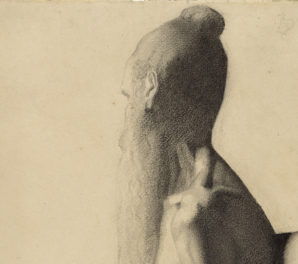“People don’t understand why Trojan Women is such a great play, because they say nothing happens,” says director Anne Bogart, explaining why SITI Company chose to adapt the ancient drama for this year’s outdoor theater production at the Getty Villa. “In fact, a great deal happens.”
In this video, the discussion of the new adaptation continues with Bogart, playwright Jocelyn Clarke, and SITI Company cast members Ellen Lauren and Leon Ingulsrud. (See the first video here.) They discuss the continuing power of the play and their collaborative approach to reinventing it for contemporary audiences.
“It’s not quite your mother’s Euripides,” says Clarke, “but it is very Euripidean.”
Also, beginning at 2:53, Ellen Lauren explains the challenges of playing Hecuba, the queen of Troy, a “stubborn, vicious, funny” woman who embodies the end of an entire culture.




Euripides’ “Trojan Women” and “The Trojan Women (after Euripides)”
Three enormous differences divide “The Trojan Women” of Euripides and “The Trojan Women (After Euripides),” which had a preview performance on September 2 at the Classical Theater in the Getty Villa at Malibu.
– The role of Athena was written out of the play. Athena, however, is the original play’s dramatic engine. Athena first took up the Greek cause, then turned against the Greeks because they are forcing her beloved Cassandra to marry Agamemnon.
– The role of Odysseus was newly introduced. In last night’s production, he appeared in his business suit to claim his prize, Queen Hecuba, and to advise her to accept what the fates decree.
– Andromache was presented as the killer of her own son, Astyanax. In the original play, Andromache says “better far is death than life with misery.” In the adaptation, this motivates Andromache’s infanticide.
Adapted by Jocelyn Clarke, “The Trojan Women (After Euripides)” adheres for the most part to Euripides’ plot. When the Greeks defeat Troy, they ensure that their victory will endure by burning the city to the ground. The women of Troy bewail their fate: they will be distributed among the Greek soldiers as concubines.
Foremost among the Trojan women is Hecuba, the widow of King Priam and mother of Hector, of Cassandra, of the murdered Polyxena, and of Paris (whose elopement with Helen provoked the Greeks). Performed by Ellen Lauren, Hecuba manifested great dignity and power.
But the differences between Euripides and the adaptation reveal the latter’s intentions.
– By excluding Athena, the adaptation obscures the importance of Cassandra, the sacred virgin dedicated to Athena. In Euripides, she is more than the mad prophetess performed by Akiko Aizawa. Cassandra is so important to Athena that, when she is forced to wed Agamemnon, Athena turns her affections from the Greeks and vows to punish them. She becomes the ally of Poseidon, the patron of the Trojans. The adaptation suggests that the Greek gods “defeated” the Trojan gods with their full-moon festivals. Trojan rites, presided over by the person of the “Chorus” (recast as a single priest-eunuch and performed by Barney O’Hanlon), were joyous and happy. The adaptation suggests that the Trojan rites must give way to the stern religiosity of the Greeks.
– The character of Odysseus (performed by Gian-Murray Gianino) is a novelty in the adaptation. He seems to be the voice of Realpolitik. Instead of sympathizing with Hecuba, he claims the older woman as his prize and advises her to accept what destiny decrees. Human beings cannot fathom the gods, distant and impersonal, and must bow to fate.
– The greatest violence to Euripides was the transformation of Andromache into the killer of her son, Astyanax. Throughout the adaptation, Andromache (performed by Makela Spielman) holds the child closely to her breast, bound in white cloth. We are meant to assume that Astyanax is sleeping. But after the Greek envoy, Talthybius (Leon Ingulsrud), demands that she surrender the child so that he can put him to death, the audience learns that Andromache has already killed her son, and his only carrying his corpse. The envoy (in another innovation) cries out that, in a situation where mothers kill their children to enable them to avoid suffering, he no longer understands why his people went to war in the first place. This rings true — but he could have said the same thing if he were allowed to take Hector’s baby son and put him to death, as Euripides originally had it.
The adaptation was movingly staged. Helen (performed by Katherine Crockett) was both seductive and cynical, winning over the weakling Menelaus with her argument for her own innocence. But the adaptation’s new elements violated the intention of Euripides. The play shifted our attention from a dispute within the Greek pantheon to the victory of the Greek gods over the Trojan fertility deities. Odysseus introduced a note of fatalism. And the infanticide committed by the sympathetic but disillusioned Andromache made a not-so-subtle plea for a culture of death when life no longer seems worth living:
I echo the sentiments of Dr. Fischer, and would also like to comment on a couple of artistic points:
It is a testament to powerful acting that three individuals were able to keep the audience engaged for nearly 100 minutes with minimal props and no intermission. The performance by Ellen Lauren (Queen Hecuba) was especially impressive; at times, I thought that she carried the performance.
Poseiden’s role in the play was one of the more interesting elements for me. I felt that his introduction monologue was a bit much to kick off the production with, though (could not some of that information been given in the program? or maybe introduced to the audience in bit-sized pieces?).
It was intriguing to see Poseiden as the “watchful” God over what was happening throughout the production, moving around the stage in the background and expressing anger, concern, and confusion in much the same way that mortal man would. The Greek conception of the Gods was certainly much different than my own, and I enjoyed seeing the dynamic between God and man throughout the entire play. This drew me into a deeper understanding of Greek mythology and the relationship with the divine in the ancient world.